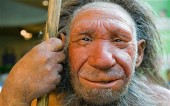Scientists Believe Neanderthals First To Be Depressed
We have known for some time about genetic predisposition to various forms of mental illness, snarkinuss eruptus and clinical depression to name only two. But if an illness is to be passed down from one generation to the next, it must have a point of origin. Now, researchers at the Department of Anthropological Psychology at the University of Basingstoke-on-Trent think they have discovered the answer.
Professor Chumley Meriwether Throckmorton announced that a recently completed in-depth study demonstrates conclusively that Neanderthals were the first humans to experience what is now referred to as clinical depression.
Professor Throckmorton elaborated at a recent press conference. “Neanderthals looked upon the world very differently than modern man. For them the world was vast and unknowable, an endless expanse of hostility and weirdness. Animals, inclement weather, and a noticeable lack of indoor plumbing loomed malevolently, providing an ongoing cavalcade of hazards.
“Unlike today's human, who feels bolstered by an unwarranted illusion of mastery over the elements, supported as he is by a cornucopia of technological gizmos resting like arrows in his quiver, which, he trusts, with endearing naiveté, are at the ready to defend him from whatever the universe may fling in his path; the poor Neanderthal had little, if anything, at his disposal. Animal pelt for clothing, sticks and stones for defense, and for comfort, well, only the sweet oblivion granted to the truly clueless.
“But if the Neanderthal knew of no other reality couldn’t we assume he was happy in his lot, no matter how modest his circumstances? Yes we could, but we would be wrong. While certainly this state of blissful ignorance characterized the earliest part of Neanderthal man's suzerainty of the earth, knowledge, like the proverbial garden apple, crept into his consciousness on velvet slippers, had velvet existed at the time, which it did not.
“It became obvious to Neanderthal man from gazing at his reflection in ponds and other glossy surfaces that he was, bluntly, unattractive. Thusly did low self-esteem enter our collective unconscious, setting the stage for poor self-image in millenia to come.
The prospect of a rapidly approaching Ice Age, if an Ice Age can be said to approach rapidly, played negatively on Neanderthal man's view of the world and contributed to his feeling that it was inhospitable and beyond defeat. Worst of all perhaps were the occasional skirmishes with homo sapiens who, combining cunning, cruelty, and superior tool-making skills, crushed Neanderthals with relentless consistency.
“This overriding anticipation of inevitable doom settled into a dense crust of depression, gradually overtaking Neanderthals.
“Once depression had burrowed into the marrow and encoded in Neanderthal DNA, the die was cast. Next came dating, or intermingling, if you prefer, with homo sapiens, which transmitted the DNA through generations all the way to you, me, and the rest of humanity.”
APA Reference
McHarg, A.
(2013, October 9). Scientists Believe Neanderthals First To Be Depressed, HealthyPlace. Retrieved
on 2026, March 5 from https://www.healthyplace.com/blogs/funnyinthehead/2013/10/scientists-believe-neanderthals-first-to-be-depressed
Author: Alistair McHarg
Hi Alistair,
You may be onto something here. In considering the phrase "words can hurt" from the now-famous tome "Words Can Hurt", I believe that in addition to dealing with "animals, inclement weather, and a noticeable lack of indoor plumbing", we should examine how name calling and taunting could have contributed to the onset of depression in early man. It may have started with Homo habilis - aka "hillbillies" - who left Africa for W.Va. where they thrived and were happy (but no one else was). Next came Homo erectus - supposedly meaning "to stand erect", but we all know better. Then, Homo neanderthalensis - aka "Neds", as in "Hey, Ned is that thal you got?". Onto Homo heidelbergensis - known as "Heidi's" who, let's be honest, were a bunch of narcicissistic twits. And, finally, Homo sapiens - meaning "wise man" in Latin. (ouch) Personally, I think we should have stopped at H. erectus. :) Doc.
Hi :) I love the idea of Neanderthals being the first to be depressed. All of trials and tribulations they didn't understand, I believe they didn't have to worry about dinosaurs at the time, but I may be wrong on that. So, ignorance is bliss I guess. That must be in our gene pool, some where we can access it when it is truly needed, and we are truly befuddled. I could use a dose of it right about now! All the best.
Actually, this one is a little too close to home. If we all realized what is in store for humanity, between Peak Oil, climate change, environmental limitations, and unsustainable debt and and an economic model that requires continued growth- well, I think there would be a lot more depression. But it is the nature of non-depressed people to discount or underestimate the probability of negative future outcomes. This is one area in which depressed people do a much better job- but no one listens to us, because we are just depressed.
Thanks for writing, Emily. In the time of Neanderthals, the hazardous nature of life on earth was the problem; today, humanity is the problem. In this respect, at least, things have improved, since humanity has the power to change itself. - We are, in a way, endlessly naive and optimistic about the consequences of our actions, I agree. But, more than anything, depression is about a fundamental misunderstanding of reality; finding reality not living up to expectations. As ever, acceptance is the key.